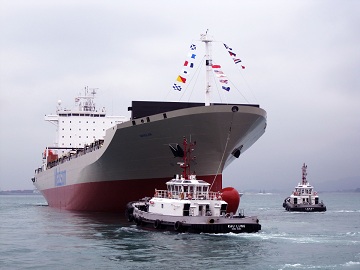 There’s plenty of disagreement in Washington over the role of government. For me, “more or less” isn’t the question. What interests me is smart government. Don’t we all want smart policies that keep us strong and competitive?
There’s plenty of disagreement in Washington over the role of government. For me, “more or less” isn’t the question. What interests me is smart government. Don’t we all want smart policies that keep us strong and competitive?
Maritime cargo preference laws help us do that and they need to be strengthened, not undermined.
Our cargo preference policies were designed decades ago to promote the health of a privately owned U.S.-flag fleet, and the maintenance of a highly trained mariner workforce. The policies do not apply to the transport of purely private commercial export-import cargoes, but only to U.S. government-generated cargoes.
The strength of a U.S.-fleet is integral to national security. It serves as a naval auxiliary in times of war or national emergency, and in fact delivered the majority of the material to our early Iraqi missions. A little known fact: since 2009, U.S.-flag vessels and U.S. maritime workers have moved more than 90 percent of all cargoes to Afghanistan and Iraq.
But military aid is only part of the story. U.S.-flag vessels also deliver humanitarian aid around the world, including grain and other staples to feed the starving.
Mostly, the system works well, but when the laws are loosely applied or undermined, our cargo can end up on privately owned ships flying foreign flags—and lead to the loss of good middle-class jobs for U.S. mariners, not to mention the hollowing out of our U.S.-flag maritime capacity.
That’s not smart government, and it’s not just hypothetical.
Last year, in the dead of night without input from TTD and its maritime unions or the maritime industry, Republicans in Congress exacerbated the already dangerous slide of our U.S. maritime industry striking at the core of our cargo preference laws. As a result, the longstanding cargo preference requirements for International Food Aid cargo was cut from 75 percent to 50 percent.
That is neither smart nor fair, and we strongly opposed this maneuver.
In fact, we supported bipartisan legislation introduced later that would have restored the food aid requirement to 75 percent. Despite bipartisan support, that measure stalled but we will push it forward this year.
The White House also bears responsibility to uphold strong cargo preference. As our Executive Committee has asserted, the Administration should commit to fully adhere to the laws and give the Maritime Administration the resources and authority it needs to implement and enforce cargo preference 100 percent of the time, throughout the federal agencies. Unfortunately, without this stepped up enforcement — and a clear directive from our government — too many cabinet agencies will continue freelancing and setting their own policies.
These reforms are smart. They are not radical nor are they burdensome.
Let’s allow our government to fulfill cargo preference laws in the spirit in which they were written into our laws. That will be our message to lawmakers and the Administration in the months ahead.